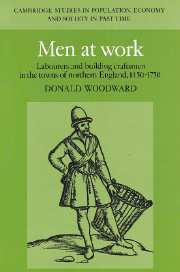Book contents
- Frontmatter
- Contents
- List of tables
- List of appendices
- Preface
- List of abbreviation
- 1 Introduction
- 2 Building craftsmen at work
- 3 The life-cycle of building craftsmen
- 4 Labourers
- 5 Conditions of work for labourers and building craftsmen
- 6 Wage rates in the northern towns
- 7 Towards an understanding of living standards
- Appendices
- Bibliography
- Index
- Cambridge Studies in Population, Economy and Society in Past Time
5 - Conditions of work for labourers and building craftsmen
Published online by Cambridge University Press: 15 October 2009
- Frontmatter
- Contents
- List of tables
- List of appendices
- Preface
- List of abbreviation
- 1 Introduction
- 2 Building craftsmen at work
- 3 The life-cycle of building craftsmen
- 4 Labourers
- 5 Conditions of work for labourers and building craftsmen
- 6 Wage rates in the northern towns
- 7 Towards an understanding of living standards
- Appendices
- Bibliography
- Index
- Cambridge Studies in Population, Economy and Society in Past Time
Summary
Except for those workmen who were employed on permanent contracts the jobs offered to labourers and craftsmen were essentially casual and intermittent. In most cases they were hired to perform a particular task and paid off once it had been completed. It was an uncertain world in which weeks or months of regular employment could be followed by a prolonged bout of idleness. Some workmen were more likely to be offered work than others. As with modern householders, there was a tendency to employ known workmen who could be relied on to give good value for money, and in all towns there were networks which could be used to suggest the name of a new workman when his skills were required: relations, neighbours, drinking companions, shopkeepers, fellow gildsmen, and churchgoers were all available for consultation. Unfortunately, the historian is rarely able to observe the operation of such networks, although churchwardens' accounts indicate that membership of a particular church could lead to the offer of work.
The importance of the parish to townsmen has been stressed for Tudor York: ‘their parish churches … had the primary claim on the loyalties of citizens … It was the parochial unit which gave the citizens their strongest sense of continuity with the past … Parochial loyalties could retain a hold on families even after they had left the city.’ Parish membership often involved workmen in the repair of the church fabric or of some other durable possession.
- Type
- Chapter
- Information
- Men at WorkLabourers and Building Craftsmen in the Towns of Northern England, 1450–1750, pp. 116 - 168Publisher: Cambridge University PressPrint publication year: 1995

